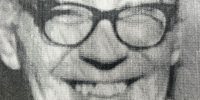The family of Patrick Duffy, who was shot up to 14 times by members of the British military in Derry in November 1978, have today lodged an application for a fresh inquest into the killing with the Attorney General for Northern Ireland.
Patrick Duffy was 50 years old when he was shot when inside 2 Maureen Avenue, Derry on the evening of 24th November 1978. The State Pathologist who later examined Mr Duffy’s body, Dr John Press, concluded that Mr Duffy was shot at least 11 times but possibly up to 14 times. The pathologist believed that bullets were fired from his left side or from behind with at least 2 of these shots being at close range. Mr Duffy was alone and unarmed at the time of the shooting. His killing is one of the earliest examples in Northern Ireland of the use of lethal force by the British army in circumstances where an arrest would have sufficed.
At the original inquest 2 soldiers admitted in their statements that they were responsible for the shooting of Mr Duffy but neither soldier gave evidence before the Coroner and jury which sat in Derry in December 1980. Written statements of evidence were simply tendered to the Coroner. Unusually, the family was represented by a legal team at the original inquest. The legal team applied to the Coroner to subpoena the soldiers to give evidence. In 1980 the Coroner ruled that he did not have the power to compel the attendance of the soldiers to give evidence. The law in relation regarding the summonsing of security force personnel changed in 2000 after a ruling from the European Court of Human Rights in Strasbourg.
The family are now asking the Attorney General to consider directing a fresh inquest into the killing.
Patricia Coyle of Harte Coyle Collins, lawyers instructed on behalf of the family said today;
“If the state is alleged to have shot dead innocent unarmed civilians it should at the very least, in applying the rule of law, guarantee the next of kin an appropriate investigative mechanism into how their loved one was killed. Mr Duffy was unarmed at the time of his killing and shot up to 14 times with 2 of the shots at close range. At the original inquest in December 1980 an application was made to the Coroner to compel the attendance of the soldiers who shot him to give evidence and be cross examined. The Coroner did not issue subpoenas on the basis that he did not have the power to do so in respect of military witnesses in 1980. The law changed in 2000 to compel the attendance of security force personnel to give evidence at inquests in Northern Ireland. We are hopeful that the Attorney General will consider the new evidence in this case and direct a fresh inquest. In the event that a fresh inquest is granted, the family will seek reassurance that the inquest system in Northern Ireland is sufficiently reformed and adequately resourced so as to ensure that it is, in fact, an appropriate investigative mechanism.”





